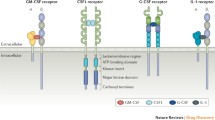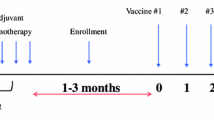Abstract
A group of 86 patients with advanced colorectal carcinoma were treated with the mouse (m) (IgG2A) or chimeric (c) monoclonal antibody (mAb) 17-1A. Prior to therapy, no patient had detectable levels of antibodies to mAb17-1A. All mmAb17-1A-treated patients (n=76) developed antibodies against both idiotypic and isotypic determinants. Addition of granulocyte/macrophage-colony-stimulating factor (GM-CSF) to mmAb17-1A significantly enhanced the induction of anti-idiotypic (ab2) as well as anti-isotypic antibodies. Of the mmAb17-1A-treated patients, 16 developed type I allergic reactions. These patients had significantly higher concentrations of anti-(mouse Ig) antibodies than patients without type I reactions. Of these 16 patients, 5 had received mmAb17-1A alone; they constituted 9% of this group (5/56). The remaining 11 patients had been given mmAb17-1A together with GM-CSF, and represented 55% of this treatment group (11/20). The difference was statistically significant (P<0.001). Of 10 patients, 9 (90%) treated with cmAb17-1A and GM-CSF developed ab2. The ab2 concentration in this patient group was significantly lower compared to those treated with mmAb-17A. Anti-(mouse Ig) antibodies caused clinical symptoms requiring therapeutic intervention in fewer than 10% of the patients treated with mmAb17-1A alone. With the addition of GM-CSF, the antibody concentration as well as the frequency of allergic side-effects calling for medical action increased significantly. Significantly more patients with a high ab2 concentration (at least 15μg/ml) 1 month after completion of mAb therapy responded to mAb treatment as compared to those with a low ab2 concentration (P<0.05). Moreover, patients with a high ab2 concentration (at least 15 μg/ml) had a median survival time of 15 months while those with a lower concentration survived for a median time of 9 months (P=0.01).
Similar content being viewed by others
References
Adams DO, Hall T, Steplewski Z, Koprowski H (1984) Tumors undergoing rejection induced by monoclonal antibodies of the IgG2A isotype containing increased numbers of macrophages activated for distinctive form of antibody dependent cytolysis. Proc Natl Acad Sci USA 81:3506
Baker TS, Begent RHJ, Dewji MR, Conlan J, Secher DS (1991) Characterization of the antibody response in patients undergoing radioimmunotherapy with chimeric B72.3. Antibody Immunoconjugates Radiopharm 4: 799
Balaszczyk-Thurin M, Thurin J, Hindsgaul O, Karlsson KA, Steplewski Z, Koprowski H (1987) Y and blood group B type 2 glycolipid antigens accumulate in a human gastric carcinoma cell line as detected by monoclonal antibody. Isolation and characterization by mass spectrometry and NMR spectroscopy. J Biol Chem 262:372
Cheung N-K, Cheung IY, Canete A, Yeh SJ, Kushner B, Bonilla MA, Heller G, Larson SM (1994) Antibody response to murine anti-GD2 monoclonal antibodies: correlation with patient survival. Cancer Res 54:2228
Douillard JY, Lehur PA, Vignoud J, Blottiere H, Maurel C, Thedrez P, Kremer M, Le Mevel B (1986) Monoclonal antibodies specific immunotherapy of gastrointestinal tumors. Hybridoma 5:139
Elliott MJ, Maini RN, Feldmann M, Long-Fox A, Charles P, Bijl H and Woody JN (1994) Repeated therapy with monoclonal antibody to tumor necrosis factor α (CA2) in patients with rheumatoid arthritis. Lancet 344:1125
Epenetos AA, Kosmas C (1989) Monoclonal antibodies for imaging and therapy. Br J Cancer 59:152
Fagerberg J, Frödin J-E, Ragnhammar P, Steinitz M, Wigzell H, Mellstedt (1994) Induction of an immune network cascade in cancer patients treated with monoclonal antibodies (ab1). II. Is induction of anti-idiotype reactive T cells (T3) of importance for tumor response to mAb therapy? Cancer Immunol Immunother 38:149
Frödin J-E, Harmenberg U, Biberfeld P, Christensson B, Lefvert A-K, Rieger Å, Shetye J, Wahren B, Mellstedt H (1988) Clinical effects of monoclonal antibodies (MAb 17-1A) in patients with metastatic colorectal carcinoma. Hybridoma 7: 309
Frödin J-E, Faxas M-E, Hagström B, Lefvert A-K, Masucci G, Nilsson B, Steinitz M, Unger P, Mellstedt H (1991) Induction of anti-idiotypic (ab2) and anti-anti-idiotypic (ab3) antibodies in patients treated with the mouse monoclonal antibody 17-1A (ab1). Relation to the clinical outcome—an important antitumoral effector function? Hybridoma 10:421
Herlyn DM, Koprowski H (1981) Monoclonal anticolon carcinoma antibodies in complement-dependent cytotoxicity. Int J Cancer 27:769
Herlyn M, Steplewski Z, Herlyn D, Koprowski H (1979) Colorectal carcinoma-specific antigen detection by means of monoclonal antibodies. Proc Natl Acad Sci USA 76:1438
Herlyn D, Lubeck M, Sears H, Koprowski H (1985) Specific detection of anti-idiotypic immune responses in cancer patients treated with murine monoclonal antibody. J Immunol Methods 85:27
Herlyn D, Sears H, Iliopoulos D, Lubeck M, Douillard J-Y, Sindelar W, Tempero M, Mellstedt H, Maher M, Koprowski H (1986) Anit-idiotypic antibodies to monoclonal antibody CO17-1A. Hybridoma 5:51
Jerne NK (1974) Towards a network theory of the immune system. Ann Immunol 125:373
Khazaeli MB, Saleh MN, Liu T, Kaladas PM, Gilman SC, LoBuglio AF (1992) Frequent anti-V-regions immune response to mouse B72.3 monoclonal antibody. J Clin Immunol 12:116
Khazaeli MB, Conry RM, LoBuglio (1994) Human immune response to monoclonal antibodies. J Immunother 15:42
Koprowski H, Herlyn D, Lubeck M, DeFreitas E, Sears HF (1984) Human anti-idiotype antibodies in cancer patients: is the modulation of the immune response beneficial for the patients? Proc Natl Acad Sci USA 81:216
Lindenmann J (1973) Speculations on idiotypes and homobodies. Ann Immunol 124:171
LoBuglio AF, Saleh M, Peterson L, et al (1986) Phase I clinical trial of CO17-1A monoclonal antibody. Hybridoma 5:117
LoBuglio AF, Wheeler RH, Trang J, Haynes A, Rogers K, Harvey EB, Sun L, Ghrayeb J, Khazaeli MB (1989) Mouse/human chimeric monoclonal antibody in man: Kinetics and immune response. Proc Natl Acad Sci USA 86:4220
Mellstedt H, Frödin J-E, Masucci G, Ragnhammar P, Fagerberg J, Hjelm A-L, Shetye J, Wersäll P, Österborg A (1991) The therapeutic use of monoclonal antibodies in colorectal carcinoma. Semin Oncol 18:462
Morrissey PJ, Bressler L, Park LS, Alpert A, Gillis S (1987) Granulocyte-macrophage colony-stimulating factor augments the primary antibody response by enhancing the function of antigen-presenting cells. J Immunol 139:1113–19
Ragnhammer P, Fagerberg J, Frödin J-E, Hjelm A-L, Lindemalm C, Magnusson I, Masucci G, Mellstedt H (1993) Effect of the monoclonal antibody 17-1A and GM-CSF in patients with advanced colorectal carcinoma-long lasting, complete remissions can be induced. Int J Cancer 53:751
Reference deleted
Riethmüller G, Schneider-Gädicke E, Schlimok G, Schmiegel W, Raab R, Höffken K, Gruber R, Pichlmaier H, Hirche H, Pichlmayr R, Buggisch P, Witte J and the German Cancer Aid 17-1A Study Group (1994) Randomised trial of monoclonal antibody for adjuvant therapy of resected Dukes' C colorectal carcinoma. Lancet 343:1177
Rodeck U, Herlyn M, Herlyn D, Molthoff C, Atkinson B, Varello M, Steplewski Z, Koprowski H (1987) Tumor growth modulation by a monoclonal antibody to the epidermal growth factor receptor; immunologically mediated and effector cell-independent effects. Cancer Res 47:3692
Saleh MN, LoBuglio AF, Wheeler RH, Rogers KJ, Haynes A, Lee JY, Kazaeli MB (1990) A phase II trial of murine monoclonal antibody 17-1A and interferon-gamma: clinical and immunological data. Cancer Immunol Immunother 32:185
Sears HF, Herlyn D, Steplewski Z, Koprowski H (1986) Initial trial use of murine monoclonal antibodies as immunotherapeutic agents for gastrointestinal adenocarcinoma. Hybridoma 5:109
Shaw D, Khazaeli MB, Suu L, Ghrayeb J, Daddona P, McKinney S, Lobuglio A (1987) Characterization of a mouse/human chimeric monoclonal antibody (17-1A) to a colon cancer tumor-associated antigen. J Immunol 138:4534
Shawler DL, Bartholomew RM, Smith LM, Dillman RO (1985) Human immune response to multiple injections of murine monoclonal IgG. J Immunol 135:1530
Sindelar WF, Maher MM, Herlyn D, Sears HF, Steplewski Z, Koprowski H (1986) Trial of therapy with monoclonal antibody 17-1A in pancreatic carcinoma: preliminary results. Hybridoma 5:125
Sun L, Curtis P, Rabrowicz-Szulezyska E, Ghrayeb J, Morrison S, Chang N, Koprowski H (1986) Chimeric antibodies with 17-1A derived variable and human constant regions. Hybridoma 5:17
Szala S, Froehlich M, Scollon M, Kasai Y, Steplewski Z, Koprowski H, Linnenbach AJ (1990) Molecular cloning of cDNA for the carcinoma-associated antigen GA733-2. Proc Natl Acad Sci USA 87:3542
Trauth BC, Klas C, Peters AMJ, Matzku S, Möller P, Falk W, Debatin KM, Krummer PH (1989) Monoclonal antibody mediated tumor regression by induction of apoptosis. Science 245:301
Werier J, Cheung AH, Matas AJ (1991) Anaphylactic hypersensitivity reaction after repeat OKT3 treatment. Lancet 337:1371
Author information
Authors and Affiliations
Rights and permissions
About this article
Cite this article
Ragnhammar, P., Fagerberg, J., Frödin, JE. et al. Granulocyte/macrophage-colony-stimulating factor augments the induction of antibodies, especially anti-idiotypic antibodies, to therapeutic monoclonal antibodies. Cancer Immunol Immunother 40, 367–375 (1995). https://doi.org/10.1007/BF01525387
Received:
Accepted:
Issue Date:
DOI: https://doi.org/10.1007/BF01525387




